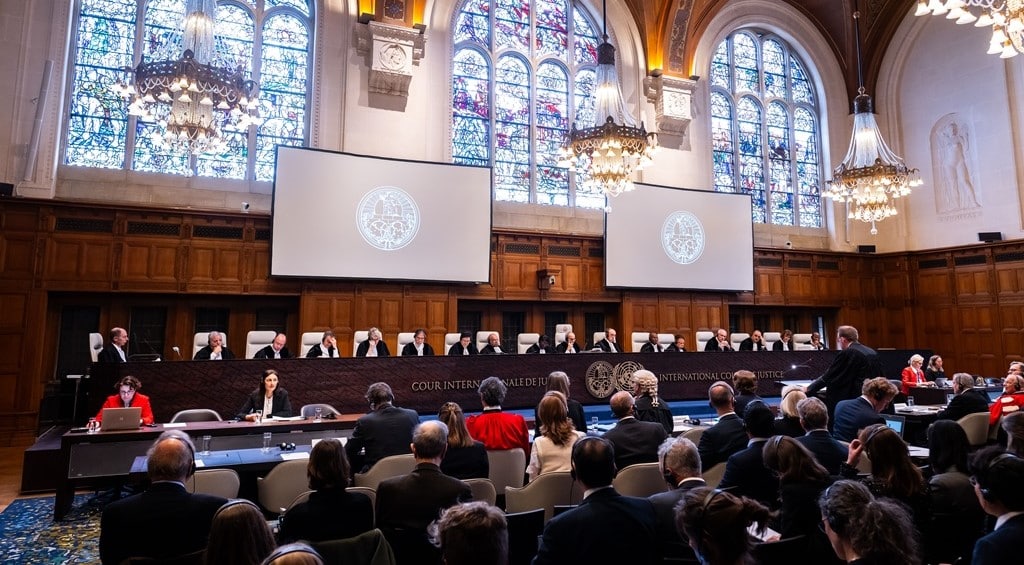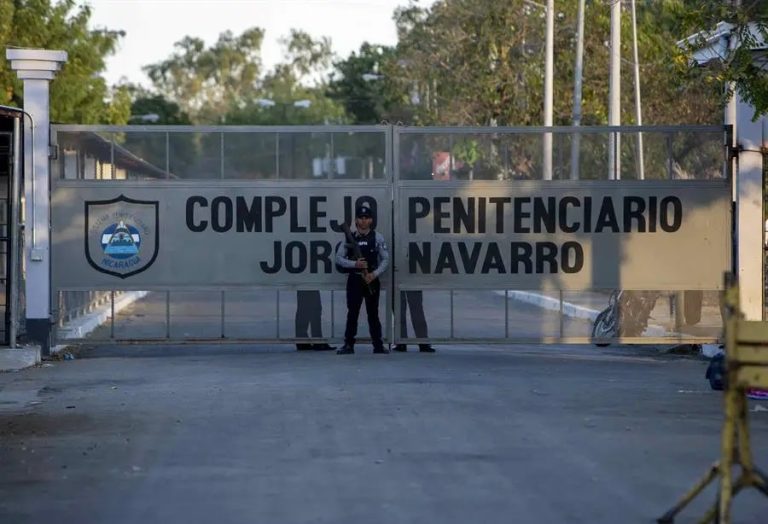17 de diciembre 2023

ICJ Rules Against Nicaragua's Request For Germany to Halt Arms Sales to Israel

PUBLICIDAD 1M
PUBLICIDAD 4D
PUBLICIDAD 5D
The seven political prisoners were transferred to maximum security cells in retaliation for a hunger strike and remain isolated

Most of the 91 political prisoners of the Ortega regime remain in the Jorge Navarro Penitentiary System, known as La Modelo. The other 60 are under house arrest. Photo: Archivo Confidencial.
Starting a hunger strike while singing the National Anthem and other Nicaraguan songs was the trigger for the Ortega dictatorship to attack some of the political prisoners in the La Modelo prison, confining seven of them to maximum security cells. In addition, another was “savagely” beaten, and a contingent of 300 riot police intervened in the prison to “restore order.”
The Grupo de Secuestrados Políticos Unidos (Group of those kidnapped for political reasons) denounced that the political prisoners in gallery 16 began a strike as the only method of protest to demand better food, respect for their night rest, since the guards beat on the bars preventing them from sleeping, more frequent trips to the yard, more humane treatment by the guards and access to reading material.
However, the response of the prison authorities was more repression. On the afternoon of December 1, after the strike began, the guards transferred seven political prisoners “shackled and chained” to maximum security cells, confirmed a family member on the condition of anonymity. The prisoners remained eleven days without family packages and personal care supplies, “which constitutes a serious violation of their rights since they are exposed to illnesses because they do not have what is necessary for their hygiene,” states the group’s denunciation.
Abdul Montoya Vivas, 65 years old; Sergio Catarino Castilblanco, 37; Edubhin Sebastian Bermudez Sevilla, 61; Geovanny Lopez Acevedo – tiktoker-; a political prisoner named Montalvan, and an unidentified person remain alone in bolted cells of two by three meters, “punished simply for demanding their rights,” denounced the ex-political prisoner and human rights defender, Ana Margarita Vijil.
Jose Antonio Castillo is the seventh political prisoner taken to a security cell. He threatened to hang himself and, on December 8, was transferred to the galleries for ordinary prisoners. He remains in a cell, to which no one can get close, with two other prisoners.
“We demand the release of the political prisoners in Nicaragua. We demand respect for the personal integrity of eachof the political prisoners, and in particular, that they respect the integrity of the seven people illegally punished in the La Modelo prison on December 1,” demanded Vijil.
A CONFIDENCIAL analysis of data from the Mechanism for the Recognition of Political Prisoners and Blue and White Monitoring revealed that, as of the end of October, Nicaragua had at least 130 political prisoners. However, the number has risen as the dictatorship has continued to imprison citizens. It is estimated that at least 151 people remain incarcerated — between prison and under house arrest.
On December 1, political prisoner Juan Carlos Baquedano, 68, was also punished. “They handcuffed him and took him to a dark area, where he was savagely tortured. He told them to take off the handcuffs to defend himself, and in response, he received more blows, returning him to the gallery in a deplorable state,” the statement said.
Baquedano was kidnapped on Wednesday, August 2, after returning from his exile in Mexico to arrange some personal and property documentation. The police took him from his home in Jinotega. In July 2018, in the context of protests against Daniel Ortega’s regime, the judge of the Second Criminal Trial District of Managua, Adela Cardoza, sentenced Baquedano to 25 years in prison for allegedly being responsible for the murder of Pablo Israel Ramos Chavarría, which occurred on June 16, 2018, and to 22 years for the crime of terrorism.
The authorities also accused him of being the “ringleader” of the groups that blocked the roads in Jinotega in protests against the dictatorship. He remained in prison for 11 months and was released by an Amnesty Law, designed by the regime to leave crimes committed by police forces, mobs, and paramilitaries in impunity.
About 300 riot police showed up at La Modelo prison, and a large number of them entered gallery 16, where political prisoners are being held. The agents ordered them to lie face down, some were beaten, and all were stripped of the packages that their relatives had delivered on November 28.
Finally, on December 8, the products were returned to them, but in the case of the perishable goods, “they were filled with worms.” This is not the first time that relatives of political prisoners denounced that the prison authorities let the foodstuffs brought by them to be delivered to prisoners of conscience rot. This new attack recalls the violence perpetrated by the Ortega regime in May 2019, when riot police savagely beat political prisoners who were carrying out a protest, in which Eddy Montes Praslim was killed.
In addition to the torture inflicted, the authorities exacerbated the conditions of political prisoners. “The food has gotten worse. The treatment is more ruthless. They are taken out in line supposedly to get some sunlight, but only a picture of them is taken, and they are immediately sent back to the cell,” the GSPU points out.
Of the 91 prisoners of conscience, 17 are women political prisoners, says the Mechanism for the Recognition of Political Prisoners (Mecanismo para el Reconocimiento de Personas Presas Políticas). They are also being subjected to “humiliating treatment” in La Esperanza prison, “where many are in maximum security, receive no medical attention, and their lives are in danger.”
The Grupo de Secuestrados Políticos Unidos demands that prison authorities respect the physical integrity of the political prisoners, stop the degrading treatment, and at the same time, remind them that “the lives of the political prisoners are under their custody and therefore, they are responsible for what happens to each one of them.”
Article translated by Havana Times.
PUBLICIDAD 3M
Confidencial es un diario digital nicaragüense, de formato multimedia, fundado por Carlos F. Chamorro en junio de 1996. Inició como un semanario impreso y hoy es un medio de referencia regional con información, análisis, entrevistas, perfiles, reportajes e investigaciones sobre Nicaragua, informando desde el exilio por la persecución política de la dictadura de Daniel Ortega y Rosario Murillo.
PUBLICIDAD 3D